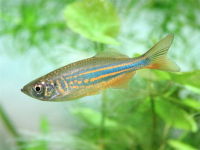Giant Danio (Devario aequipinnatus)
From The Aquarium Wiki
Giant Danio
Devario aequipinnatus
208 Litres (55 US G.)
10.2-15.2cm (4-6 ")
Freshwater
6.0 - 8.0
22 -24 °C (71.6-75.2°F)
5-19 °d
1:2 M:F
5-8 years
Family
Cyprinidae
Contents
Additional names
- Giant Danio
Additional scientific names
- Danio aequipinnatus, Perilampus aequipinnatus, Leuciscus aequipinnatus
Origin[edit]
- This large Danio comes from clear streams and rivers in Sri Lanka, Nepal, and the west coast of India. They live in moving water with rocky gravel bottoms
Sexing[edit]
- Females will appear more full in the belly.
Tank compatibility[edit]
- An active fish that appreciates company of its own kind and will shoal somewhat. Should not be kept with slow-moving or long-finned fish, such as Angelfish and Bettas. They are generally between peaceful to semi-aggressive behavior, depending on the fish itself. Since they are fairly larger than their other relatives, that makes them good candidates for an aggressive community with large cichlids, but then again, some giant danios will be eaten occasionally, so don't be surprised if one disappears here or there. They are good with aggressive, large cichlids, because of their ability to dart away at light speed. Tankmates should be robust, and can be somewhat suitable for the standard community.
Diet[edit]
Feeding regime[edit]
- Feed once or twice a day.
Environment specifics[edit]
- These fish are very active fish that need as much lateral swimming space as possible. Filtration should be excellent and they should have some current.
Behaviour[edit]
A very active yet extremely skittish fish. Good for the majority of Tetras and other community fish. Just make sure the fish aren't slow or long-finned.
Identification[edit]
- The largest of the Danios, this fish has short rounded fins, a forked caudal tail and is iridescent with yellow lateral broken bars with some blue iridescent beneath.
Pictures[edit]
Videos[edit]
External links[edit]
- Fishbase (Mirrors:
 )
)

